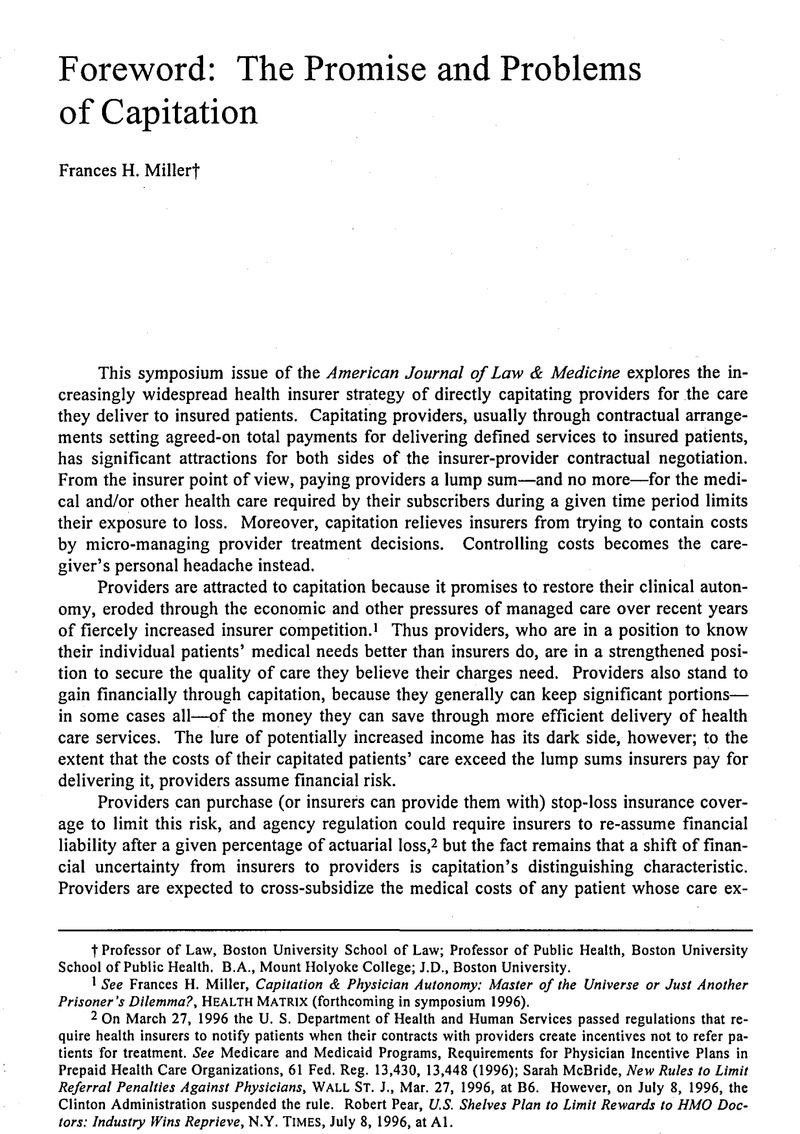Published online by Cambridge University Press: 24 February 2021

1 See Miller, Frances H., Capitation & Physician Autonomy: Master of the Universe or Just Another Prisoner’s Dilemma?, Health Matrix (forthcoming in symposium 1996).Google ScholarPubMed
2 On March 27, 1996 the U. S. Department of Health and Human Services passed regulations that require health insurers to notify patients when their contracts with providers create incentives not to refer patients for treatment. See Medicare and Medicaid Programs, Requirements for Physician Incentive Plans in Prepaid Health Care Organizations, 61 Fed. Reg. 13,430, 13,448 (1996); McBride, Sarah, New Rules to Limit Referral Penalties Against Physicians, Wall St. J., Mar. 27, 1996, at B6Google Scholar. However, on July 8, 1996, the Clinton Administration suspended the rule. Robert Pear, U.S. Shelves Plan to Limit Rewards to HMO Doctors: Industry Wins Reprieve, Times, N.Y. , July 8, 1996, at A1.Google Scholar
3 See generally SAMUELS, DAVID I. , Capitation: New Opportunities in Healthcare Delivery (1996).Google Scholar
4 See generally GLennerster, Howard ET AL., Implementing GP Fundholding (1994).Google Scholar
5 See generally Furrow, Barry R. ET AL., Health Law: Cases, Materials and Problems § 11-12, at 534-35 (1991)Google Scholar (briefly describing historical development of health insurance in the United States).
6 See, e.g., Colo. Rev. Stat. § 12-36-134 (1991); Ohio Rev. Code Ann. § 1701.03 (Anderson 1993).
7 American Med. Ass'n v. United States, 130 F.2d 233, 240-41 (D.C Cir. 1942), aff'd, 317 U.S. 519 (1943). See generally Havighurst, Clark C , Professional Restraints on Innovation in Health Care Financing, 1978Google Scholar Duke, L.J. 303.Google Scholar
8 The HMO Act of 1973, 42 U.S.C. §§ 300e to 300e-17 (1994), over-rode state statutory barriers for qualifying HMOs. Antitrust doctrine also began to develop in the 1970s in a way that opened up possibilities for antitrust enforcement in the health sector. Furrow et al., supra note 5, § 10-1, at 367-68.
9 DRG payments provide hospitals flat sums to cover the costs of inpatient care for Medicare patients sharing the same diagnosis, regardless of the amount of services an individual patient may consume. See Kinney, Eleanor D. , Making Hard Choices Under the Medicare Prospective Payment System: One Administrative Model for Allocating Medical Resources Under a Government Health Insurance Program, 19 Ind. L. Rev. 1151, 1151 & n.4 (1986)Google Scholar; Mariner, Wendy K. , Prospective Payment for Hospital Services: Social Responsibility and the Limits of Legal Standards, 17 Cumb. L. Rev. 379, 379 n.l, 380-81 (1987).Google Scholar
10 See Furrow et al., supra note 5, § 13-16.
11 McMillan, Alma, Trends in Medicare Health Maintenance Organization Enrollment: 1986-93, Health Care Fin. Rev., Fall 1993, at 135.Google ScholarPubMed
12 See generally The Balanced Budget Act of 1995, H.R. 2491, 104th Cong., 1st Sess. (1995), The Common Sense Balance Budget Act of 1995, H.R. 2530, 104th Cong., 1st Sess. (1995), and a Clinton Administration bill not yet sent to Congress, discussed in Hirshfeld, Edward B., Provider Sponsored Organizations and Provider Service Networks Rationale and Regulation, 22 Am. J.L. & Med. 263, 263 (1996).Google ScholarPubMed
13 TennCare in Tennessee is one example of a state Medicare program that has embraced HMO ideals. See Blumstein, James F., Health Care Reform: The Policy Context, 29Google Scholar Wake, Forest L. Rev. 15, 40-42 (1994).Google Scholar
14 42 U.S.C. §§ 1396-1396v (1994).
15 Hilary, Stout & David, Rogers, GOP Plan to Cut the Deficit by Slashing Medicare Faces Political Risks as Most Voters Oppose Move, Wall st. J., Apr. 27, 1995, at A16.Google Scholar
16 Emmons, David W. & Simon, Carol J., The Impact of Capitation on Physician Earnings 2 (May 1996) (presented at the 1996 Health Economics Conference, Boston University) (available from Center for Health Pol'y Res., American Med. Ass'n).Google Scholar
17 For example, Leonard Abramson, the founder and chairman of U.S. Healthcare, earned about $920 million in cash and stock when his company was bought out by insurance giant Aetna.Winslow, Ron & Scism, Leslie, Aetna Agrees to Acquire U.S. Healthcare, Wall St. J., Apr. 2, 1996, at A2.Google Scholar